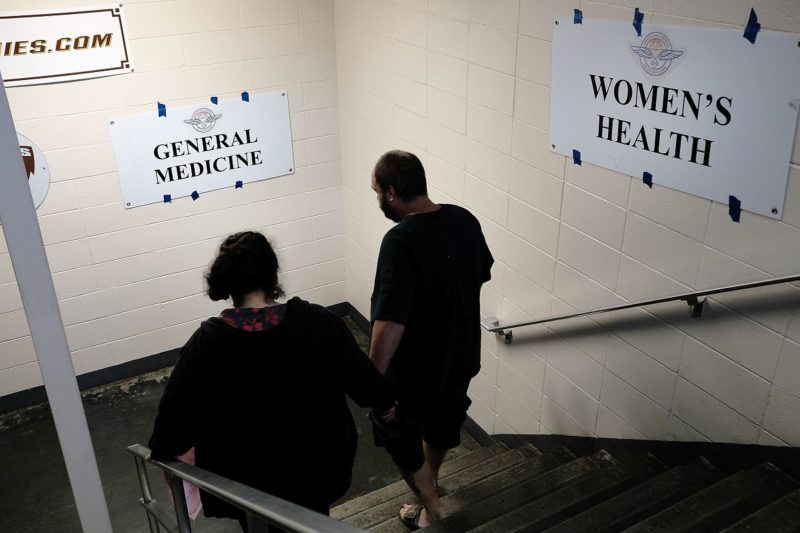Here’s How Chris Christie’s Health-Care Budget Cuts Affected Women in New Jersey
New Jersey Democratic lawmakers are about to restore family planning funding, more than $50 million of which was cut by former Gov. Chris Christie over seven years.

Former New Jersey Gov. Chris Christie’s (R) cuts to reproductive health and family services led to women and families becoming unhealthier in New Jersey, according to a report from Planned Parenthood.
The number of new cases of bacterial sexually transmitted infections increased 35 percent between 2009 and 2015. Cases of breast and cervical cancer increased 5.2 percent from 2009 to 2013, with women of color disproportionately affected. The number of women needing publicly supported contraception increased by 5 percent between 2010 and 2013, and about 295,000 New Jersey women of reproductive age remain uninsured, according to “Access at Risk,” a 2017 report from the Planned Parenthood Action Fund of New Jersey.
That’s a snapshot of what happened in the Garden State since Christie slashed a $7.45 million family planning line item from the state budget in 2010—a cut that new Gov. Phil Murphy (D) has promised to restore.
“Restoring family planning funding is a great first step for the Murphy administration to help put New Jersey back on the right track when it comes to reproductive health. This funding will help New Jersey’s family planning providers, including Planned Parenthood, begin to address these disparities,” said Casey Olesko, communications director of Planned Parenthood in New Jersey.
Christie’s vetoes over seven years added up to more than $50 million in lost investments in women’s health; the funding accounted for 0.022 percent of the total statewide budget, the report noted.
Despite Christie’s defunding of family planning services, New Jersey ranked fourth in the United States and got a grade of A- in reproductive rights in a 2015 report from the Institute for Women’s Policy Research titled “The Status of Women in the States.”
As a bill to restore family planning funding makes it way to the governor’s desk this month, Olesko told Rewire she is looking forward to the Democratic-majority New Jersey legislature making strides in expanding reproductive health and family services.
“The Murphy administration can also help protect New Jerseyans from harmful policies put forth by the Trump-Pence administration,” she said. “As we saw all throughout 2017, the administration time and time again is trying to reduce access to reproductive health care.”
These include repeated attempts to repeal the Affordable Care Act, attempts to defund Planned Parenthood (which prevents Medicaid recipients from receiving care at these health centers), and the move last week to create a Conscience and Religious Freedom Division inside the Department of Health and Human Services to allow health-care workers to deny reproductive services and services for transgender people.
While restoring the funding is a good first step to reversing the harmful effects of Christie’s cuts, “the Murphy administration can also help protect New Jerseyans from harmful policies put forth by the Trump-Pence administration,” Olesko said.
As the report points out, “family planning is essential health care.” Nearly 100,000 people receive preventive health services from Planned Parenthood and other health-care providers across the state each year.
“For many women in America, Planned Parenthood is the only place where they are able to get needed quality care,” Dr. Mark S. DeFrancesco, past president of the American Congress of Obstetricians and Gynecologists, said in the report.
Every dollar invested in publicly funded family planning services saves more than $7 in other public funding when unintended pregnancies are prevented, according to the Guttmacher Institute. In 2010, 53 percent of all pregnancies in New Jersey were unplanned. That same year, public spending for unplanned pregnancies in New Jersey totaled an estimated $477 million, the report states.
Spacing out pregnancies helps lower premature births and prevent low birth weight. Family planning services also help save costs when cases of breast and cervical cancer, HIV, and sexually transmitted infections (STI) are averted, caught early and easily treated. In 2015, family planning providers across New Jersey administered 27,255 HIV tests and 106,727 tests for bacterial STIs including chlamydia, gonorrhea and syphilis, according to the report.
New Jersey has historically had one of the highest percentages of new HIV infections occurring in women, according to the New Jersey Department of Health. At the end of 2015, 33 percent of the 37,435 people living with HIV or AIDS in New Jersey were women; 44 percent of them were between the ages of 20 and 49, which closely matches the age of the patients served by family planning providers statewide, the report states.
Data on the increasing rate of STIs shows that New Jersey predates the national uptick, with increasing cases seen in 2010, the year after funding for family planing services was axed.
“Supporting family planning services and access to reproductive health care helps women and families lead healthy lives and achieve economic stability. It is a smart long-term investment for taxpayers–and smart fiscal policy for the state and for the country,” the Access at Risk report says.
